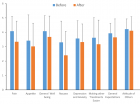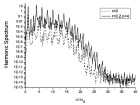Abstract
Research Article
Growth Promoting Potential and Colonization Ability of Probiotics (Bacillus coagulans and Bacillus subtilis) on the Freshwater Prawn Macrobrachium rosenbergii Post-Larvae
Saravana Bhavan P*, Karthik M and Manjula T
Published: 16 January, 2018 | Volume 2 - Issue 1 | Pages: 007-018
The probiotic effects of Bacillus coagulans and Bacillus subtilis were studied on survival, growth, concentrations of basic biochemical constituents, activities of digestive enzymes, and their colony establishments in the gut of Macrobrachium rosenbergii post-larvae (PL). Eleven groups of PL (2.03±0.05 in length and 0.18±0.01g in weight), each consists of 35 individuals maintained in 25 L of ground water and fed ad libitum with five serially diluted concentrations, 10-1, 10-3, 10-5, 10-7 and 10-9 of B. coagulans, and B. subtilis incorporated diets containing 40% protein, for 45 days. Diet without incorporation of any of these probiotics was served as control. These probiotics were found to be alive in the respective feed even on day-15 after their formulations. Significant improvement in survival, nutritional indices (weight gain, specific growth rate, food conversion ratio and protein efficiency ratio), contents of basic biochemical constituents (total protein, amino acid, carbohydrate and lipid) and activities of digestive enzymes (protease, amylase and lipase) were observed (P<0.05), particularly in 10-7 concentration of B. coagulans, and B. subtilis incorporated diets fed PL when compared with control. The biochemical confirmation tests revealed that presence of Escherichia coli, Acetonobacter sp., Salmonella sp., and Pseudomonas sp., in the gut of control PL. In the gut of PL fed with B. coagulans incorporated diet, Acetonobacter sp., Salmonella sp., and Pseudomonas sp., were found to be competitively excluded, whereas, in the gut of PL fed with B. subtilis incorporated diet, Acetonobacter sp., and Salmonella sp., only were found to be excluded competitively. Actually, colonies of Bacillus sp., and Lactobacillus sp., were found to be establishment in the gut of PL fed with B. coagulans, and B. subtilis incorporated diets. Overall, these probiotics incorporated diets produced better growth and survival due to better FCR and activities of digestive enzymes, which in turn led to better nutritional profile. Therefore they are recommended as feed additives for sustainable culture of M. rosenbergii.
Read Full Article HTML DOI: 10.29328/journal.ibm.1001011 Cite this Article Read Full Article PDF
Keywords:
M rosenbergii; B coagulans; B subtilis; Growth; Protein
References
- Fish stat plus-universal software for fishery statistical time series comments/inquiries sitemap Logine-Bulletin© FAO. National aquaculture sector overview India. 2010.
- Yearbook, Fishery statistics, aquaculture production. 2005.
- El-Haroun ER, Goda AMAS, Chowdhury MAK. Effect of dietary probiotic Biogen (R) supplementation as a growth promoter on growth performance and feed utilization of Nile tilapia Oreochromis niloticus (L.). Aquaculture. 2006; 37: 1473-1480. Ref.: https://goo.gl/RJgLXx
- Saad AS, Habashy MM, Khadiga Growth response of the freshwater prawn, Macrobrachium rosenbergii (De Man), to diets having different levels of Biogen. World Applied Sciences Journal. 2009; 6: 550-556. Ref.: https://goo.gl/EoqR1H
- Seenivasan C, Bhavan PS, Radhakrishnan S. Effect of probiotics (BinifitTM) on survival, growth, biochemical constituents and energy budget of the freshwater prawn Macrobrachium rosenbergii post larvae. Aquaculture Elixir International Journal. 2011; 41: 5919-5927. Ref.: https://goo.gl/hMZDea
- Seenivasan C, Radhakrishnan S, Muralisankar T, Saravanabhavan P. Influence of combined probiotics Lactobacillus sporogenes and Bacillus subtilis on survival, growth, biochemical changes and energy utilization performance of Macrobrachium rosenbergii (De Man 1879) post larvae. Journal of Ecobiotechnology. 2012; 4: 29-34. Ref.: https://goo.gl/DMxmZ5
- Seenivasan C, Saravana Bhavan P, Radhakrishnan S, Muralisankar T. Effects of Probiotics on Survival, Growth and Biochemical Constituents of Freshwater Prawn Macrobrachium rosenbergii Post Larvae. Turkish Journal of Fisheries and Aquatic Sciences. 2012; 12: 331-338. Ref.: https://goo.gl/BryXYs
- Seenivasan C, Radhakrishnan S, Muralisankar T, Saravana Bhavan P. Efficacy of Probiotics on Survival, Growth, Biochemical Changes and Energy Utilization Performance of Macrobrachium rosenbergii (De Man 1879) Post-larvae. Journal of Scientific Research. 2012; 4: 729-740. Ref.: https://goo.gl/8gFu5L
- Seenivasan C, Radhakrishnan S, MuralisankarT, Bhavan PS. Effects of probiotics on survival, growth and digestive enzymes activities in freshwater prawn Macrobrachium rosenbergii (De Man 1879). Proceedings of the Zoological Society. 2014; 69: 52-60. Ref.: https://goo.gl/5a3Umq
- Jayanthi L, Bhavan PS, Srinivasan V, Muralisankar T, Manickam N, et al. Probiotics product (LactoBacil®plus) on improvement of survival, growth, digestive enzymes activity, nutritional status and gut microflora of the prawn Macrobrachium rosenbergii. International Journal of Current Research. 2015; 7: 11440-11453.
- Jayanthi L, Bhavan PS, Srinivasan V, Muralisankar T, Manickam N, et al. Dietary supplementation of probiotics product (ViBact*) on the survival, growth, biochemical constituents and gut microflora of the giant freshwater prawn Macrobrachium rosenbergii post-larvae. Asian Journal of Biochemical and Pharmaceutical Research. 2015; 2: 67-88.
- Sumon MS, Ahmmed F, Khushi SS, Ahmmed MK, Rouf MA, et al. Growth performance, digestive enzyme activity and immune response of Macrobrachium rosenbergii fed with probiotic Clostridium butyricum incorporated diets. Journal of King Saud University-Science. 2016. Ref.: https://goo.gl/VaUDQw
- Gupta A, Verma G, Gupta P. Growth performance, feed utilization, digestive enzyme activity, innate immunity and protection against Vibrio harveyi of freshwater prawn, Macrobrachium rosenbergii fed diets supplemented with Bacillus coagulans. Aquaculture International. 2016; 24: 1379-1392. Ref.: https://goo.gl/YQSNmF
- Karthik M, Saravana Bhavan P. Supplementation of Lactobacillus brevis for Growth Promotion of the Freshwater Prawn Macrobrachium rosenbergii Post Larvae and Identification of Gut Microflora through 16s rDNA. Research journal of biotechnology. 2018; 13: 34-50.
- Hyronimus B, Le Marrec C, Urdacil M. Coagulin, a bacteriocin-like inhibitory substance produced by Bacillus coagulans, I4. Journal of Applied Microbiology. 1998; 85: 42-50. Ref.: https://goo.gl/dgNQJi
- Hyronimus B, Le Marrec C, Sassi AH, Deschamps A. Acid and bile tolerance of spore-forming lactic acid bacteria. International Journal Food and Microbiololgy. 2000; 61: 193-197. Ref.: https://goo.gl/TBk7xw
- Donskey CJ, Hoyen CK, Das SM, Farmer S, Dery M, et al. Effect of oral Bacillus coagulans administration on the density of vancomycin-resistant Enterococci in the stool of colonized mice. Letters in Applied Microbiology. 2001; 33: 84-88. Ref.: https://goo.gl/4X3GsH
- Pinchuk IV, Bressollier P, Verneuil B, Fenet B, Sorokulova IB, et al. In vitro anti-Helicobacter pylori activity of the probiotic strain Bacillus subtilis 3 is due to secretion of antibiotics. Antimicrobial Agents and Chemotherapy. 2001; 45: 3156-3161. Ref.: https://goo.gl/WtU5e2
- 2005. Standard Methods for the Examination of Water and Wastewater. 21st Edn, American Public Health Association, Washington, DC., USA. 2005
- Winkler LW. Die Best immung des in Wasser gelosten Sauerstoffen. Ber Dtsch Chem Ges. 1888.21: 2843-2855.
- Solorzano L. Determination of ammonia in natural waters by the Phenolhypochlorite method. Limnology and Oceanography. 1969; 14: 799-801. Ref.: https://goo.gl/2EX5qJ
- Official methods of analysis of AOAC international. Vols. 2, 16th edn. Arlington, VA, USA, Association of Analytical Communities. 1995. Ref.: https://goo.gl/a73bz3
- Tekinay AA, Davies SJ. Dietary carbohydrate level influencing feed intake, nutrient utilization and plasma glucose concentration in the rainbow trout, Oncorhynchus mykiss. Turkish journal of veterinary and animal sciences. 2011; 25: 657-666. Ref.: https://goo.gl/Mfc8DS
- Lowry OH, Rosenbrough WJ, Fair AL, Randall RJ, Rose J Randall. Protein measurement with the Folinphenol reagent. The Journal of Biological Chemistry. 1951; 193: 265-275. Ref.: https://goo.gl/jJ2BMR
- Moore S, Stein WH. Polyphenol oxidase. In: Methods in Enzymol. (eds. by S.P. Colowick & N.D. Kaplan), Academic Press, New York, 1948.
- Roe JH. The determination of sugar and blood and spinal fluid with anthrone reagent. The Journal of Biological Chemistry. 1955; 212: 335-343. Ref.: https://goo.gl/1swAQm
- Folch J, Lees M, Bloane Stanley GH. A simple method for the isolation and purification of total lipids from animal tissues. Journal of Biological Chemistry. 1957; 266: 497-509.
- Barnes H, Blackstock J. Estimation of lipids in marine animals and tissues. Detail investigation of the sulpho-phosphovanillin method for total lipids. Journal of Experimental Marine Biology and Ecology. 1973; 12: 103-118. Ref.: https://goo.gl/uXaxra
- Furne M, Hidalgo MC, Lopez A, Garcia-Gallego M, Morales AE, et al. Digestive enzyme activities in Adriatic sturgeon Acipensernaccarii and rainbow trout Oncorhynchus mykiss, A comparative study. Aquaculture. 2005; 250: 391-398. Ref.: https://goo.gl/vJ6yc1
- Bernfeld P. Amylases alpha and beta. Methods in enzymology. Academic Press. 1955; 140-146.
- Holt JG, Krie NR, Sneath PHA, Stately JT, Williams ST. Bergey’s Manual of Determinative Bacteriology, 9th Ed, Baltimore, Williams and Wilkins. 1996; 787.
- Suralikar V, Sahu NP. Effect of feeding probiotic (Lactobacillus cremoris) on growth survival of Macrobrachium rosenbergii postlarvae. Journal of Applied Animal Research. 2001; 20: 117-124. Ref.: https://goo.gl/TzcirL
- Keysami MA, Saad CR, Sijam K, Daud HM, Alimon AR. Effect of Bacillus subtilis on growth development and survival of postlarvae Macrobrachium rosenbergii (de Man). Aquaculture Nutrition. 2007; 13: 131-136. Ref.: https://goo.gl/v4kot5
- Shinde AN, Mulye VB, Chogale ND, Bhatkar VR, Bondre RD, et al. Effect of different probiotics on Macrobrachium rosenbergii (De Man) post larvae. Aquaculture. 2008; 9: 7-12.
- Rinisha K, Mujeeb Rahiman KM, RaziaBeevi M, Thomas AP, Mohamed Hatha AA, et al. Probiotic Effects of Bacillus spp. On the growth and survival of postlarvae of Macrobrachium rosenbergii. Fishery Technology. 2010; 47: 173-178.
- Mujeeb Rahiman KM, Jesmi Y, Thomas AP, Mohamed Hatha AA. Probiotic effect of Bacillus NL110 and Vibrio NE17 on the survival, growth performance and immune response of Macrobrachium rosenbergii (De Man). Aquaculture Research. 2010; 41: 120-134. Ref.: https://goo.gl/6fRpPg
- Lahteinena T, Lindholma A, Rinttilaa T, Junnikkalaa S, Kant R, et al. Effect of Lactobacillus brevis ATCC 8287 as a feeding supplement on the performance and immune function of piglets. Veterinary Immunology and Immunopathology. 2013; 158: 14-25. Ref.: https://goo.gl/ZUM2JY
- Zarif BR, Azin M. Identifying probiotics of Macrobrachium rosenbergii’sintestine micro flora and their effect in prawn’s growth and survival. Advances in Life Sciences. 2014; 4: 123-130. Ref.: https://goo.gl/9XckTM
- Prasuna Devi DV, Hareesh K, Srinivasulu Reddy M. Studies on the proximate composition of tropical freshwater prawn Macrobrachium rosenbergii. International Journal of Fisheries and Aquatic Studies. 2015; 3: 329-336. Ref.: https://goo.gl/Ssc7w6
- Venkat HK, Sahu NP, Jain KK. Effect of feeding Lactobacillus based probiotics on the gut microflora, growth and survival of post larvae of Macrobrachium rosenbergii (de Man). Aquaculture Research. 2004; 35: 501-507. Ref.: https://goo.gl/mhCNbP
- Deeseenthum S, Leelavatcharams V, Brook DJ. Effects of feeding Bacillus sp. as probiotic bacteria on growth of giant freshwater prawn Macrobrachium rosenbergii (De man). Pakistan Journal of Biological Sciences. 2007; 10: 1481-1485. Ref.: https://goo.gl/z42hVc
- Karthik M, Saravana bhavan P , Seenivasan V, Asaikkutti A, Muralisankar T, et al. Dietary supplementation of lactobacillus fermentum to improve the survival, growth and nutritional profiles of the prawn macrobrachium rosenbergii, and identification of its establishment using 16s rDNA. Asian Journal of Microbiology, Biotechnology & Environmental Sciences. 2017.
- Ziaei Nejad S, Rezaei MH, Takami GA, Lovett DL, Mirvaghefi AR, et al. The effect of Bacillus spp. bacteria used as probiotics on digestive enzyme activity, survival and growth in the Indian white shrimp, Fenneropenaeus indicus. Aquaculture. 2006; 252: 516-524. Ref.: https://goo.gl/kLPLJZ
- Wang YB, Xu ZR. Effect of probiotics for common carp (Cyprinus carpio) based on growth performance and digestive enzyme activities. Animal Feed Science and Technology. 2006; 127: 283-229. Ref.: https://goo.gl/eMdnBW
- Yu MC, Li ZJ, Lin HZ, Wen GL, Ma Shen. Effects of dietary medicinal herbs and Bacillus on survival, growth, body composition, and digestive enzyme activity of the white shrimp Litopenaeus vannamei. Aquaculture International. 2009; 17: 377-384. Ref.: https://goo.gl/FSggXJ
- Zheng X, Duan Y, Dong H, Zhang J. Effects of dietary Lactobacillus plantarum in different treatments on growth performance and immune gene expression of white shrimp Litopenaeus vannamei under normal condition and stress of acute low. Salinity. Fish and Shellfish Immunology. 2017; 62: 195-201. Ref.: https://goo.gl/eNYU3N
- Dash G, Raman RP, Prasad KP, Marappan M, Pradeep MA, et al. Evaluation of Lactobacillus plantarum as a water additive on host associated microflora, growth, feed efficiency and immune response of giant freshwater prawn, Macrobrachium rosenbergii (de Man, 1879). Aquaculture Research. 2014; 47: 804-818. Ref.: https://goo.gl/kdeHTW
- Cain K, Swan C. Barrier function and immunology. In: The Multifunctional Gut of Fish (ed. by M. Grosell, A.P. Farrell & C.J. Brauner). 2010; 111-134.
- Gaggia F, Mattarelli P, Biavati B. Probiotics and prebiotics in animal feeding for safe food production. International Journal of Food Microbiology. 2010; 14: 15-28. Ref.: https://goo.gl/Xh8TyW
- Gomez GD, Balcazar JL. A review on the interactions between gut microbiota and innate immunity of fish. FEMS Immunology and Medical Microbiology. 2008; 52: 145-154. Ref.: https://goo.gl/YvrPfL
- Rungrassamee W, Klanchui A, Chaiyapechara S, Maibunkaew S, Tangphatsornruang S, et al. Bacterial population in intestines of the black tiger shrimp (Penaeus monodon) under different growth stages. Plos one. 2013. Ref.: https://goo.gl/X6gGNV
- Charles DK, Mark BM, Samuel M, Andrew T, Nathan LM, et al. Isolation and Identification of Potential Probiotics Bacteria from the Gut of Oreochromis niloticus and Clarias gariepinus in Uganda. British Microbiology Research Journal. 2016. Ref.: https://goo.gl/N7w38j
Figures:

Figure 1
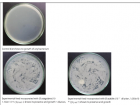
Figure 2
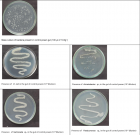
Figure 3
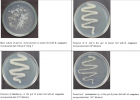
Figure 4
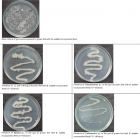
Figure 5
Similar Articles
-
Endothelial Repair and Endothelial Cell-Derived SecretomeAlexander E. Berezin*. Endothelial Repair and Endothelial Cell-Derived Secretome . . 2017 doi: 0.29328/journal.hjbm.1001001; 1: 001-008
-
Transglutaminase inhibition: possible therapeutic mechanisms to protect cells from death in neurological disordersVittorio Gentile*,Elenamaria Fioretti,Nicola Gaetano Gatta,Rosaria Romano. Transglutaminase inhibition: possible therapeutic mechanisms to protect cells from death in neurological disorders . . 2017 doi: 10.29328/journal.hjbm.1001004; 1: 026-038
-
Surface Plasmon Resonance technology to assess biological interactionsSilvia Bartollino*,Alessandro Medoro,Donatella Mignogna,,Erika di Zazzo,Bruno Moncharmont. Surface Plasmon Resonance technology to assess biological interactions . . 2017 doi: 10.29328/journal.hjbm.1001005; 1: 039-044
-
The master regulator gene PRDM2 controls C2C12 myoblasts proliferation and Differentiation switch and PRDM4 and PRDM10 expressionBartollino Silvia*,Di Zazzo Erika,Moncharmont Bruno. The master regulator gene PRDM2 controls C2C12 myoblasts proliferation and Differentiation switch and PRDM4 and PRDM10 expression. . 2017 doi: 10.29328/journal.hjbm.1001007; 1: 075-091
-
Maternal thyroid dysfunction and neonatal cardiac disordersAhmed RG*. Maternal thyroid dysfunction and neonatal cardiac disorders. . 2017 doi: 10.29328/journal.ibm.1001008; 1: 092-096
-
Growth Promoting Potential and Colonization Ability of Probiotics (Bacillus coagulans and Bacillus subtilis) on the Freshwater Prawn Macrobrachium rosenbergii Post-LarvaeSaravana Bhavan P*,Karthik M,Manjula T. Growth Promoting Potential and Colonization Ability of Probiotics (Bacillus coagulans and Bacillus subtilis) on the Freshwater Prawn Macrobrachium rosenbergii Post-Larvae . . 2018 doi: 10.29328/journal.ibm.1001011; 2: 007-018
-
Phytochemicals candidates as promising preventives and/or curatives for COVID-19 Infection: A brief reviewSelma Hamimed*,Nejib Jebli,Rayene Hamimed,Ahmed Landoulsi,Abdelwaheb Chatti. Phytochemicals candidates as promising preventives and/or curatives for COVID-19 Infection: A brief review. . 2021 doi: 10.29328/journal.ibm.1001019; 5: 001-006
Recently Viewed
-
Impact of Moringa oleifera Leaf Flour supplement on Weight Gain in Moderately Acutely Malnourished Children in BeninLaleye Flora Tinouade Founmilayo*, Fanou Fogny Nadia and Kayode Polycarpe. Impact of Moringa oleifera Leaf Flour supplement on Weight Gain in Moderately Acutely Malnourished Children in Benin. Arch Food Nutr Sci. 2023: doi: 10.29328/journal.afns.1001052; 7: 070-077
-
Drug Rehabilitation Centre-based Survey on Drug Dependence in District Shimla Himachal PradeshKanishka Saini,Palak Sharma,Bhawna Sharma*,Atul Kumar Dubey,Muskan Bhatnoo,Prajkta Thakur,Vanshika Chandel,Ritika Sinha. Drug Rehabilitation Centre-based Survey on Drug Dependence in District Shimla Himachal Pradesh. J Addict Ther Res. 2025: doi: 10.29328/journal.jatr.1001032; 9: 001-006
-
Feature Processing Methods: Recent Advances and Future TrendsShiying Bai,Lufeng Bai*. Feature Processing Methods: Recent Advances and Future Trends. J Clin Med Exp Images. 2025: doi: 10.29328/journal.jcmei.1001035; 9: 010-014
-
Relationship between Vitamin D Deficiency and Lipopolysaccharides Porphyromonas gingivalis Bacteria in Stunting ChildrenErwin Gunawan*,Ria Puspitawati. Relationship between Vitamin D Deficiency and Lipopolysaccharides Porphyromonas gingivalis Bacteria in Stunting Children. Ann Biomed Sci Eng. 2024: doi: 10.29328/journal.abse.1001033; 8: 059-065
-
Addiction to self-strangulation: a case-reportAurely Ameller*,Yann Le Strat,Marion Cadranel,Celine Portalier, Caroline Dubertret. Addiction to self-strangulation: a case-report . J Addict Ther Res. 2017: doi: 10.29328/journal.jatr.1001003; 1: 016-021
Most Viewed
-
Evaluation of Biostimulants Based on Recovered Protein Hydrolysates from Animal By-products as Plant Growth EnhancersH Pérez-Aguilar*, M Lacruz-Asaro, F Arán-Ais. Evaluation of Biostimulants Based on Recovered Protein Hydrolysates from Animal By-products as Plant Growth Enhancers. J Plant Sci Phytopathol. 2023 doi: 10.29328/journal.jpsp.1001104; 7: 042-047
-
Sinonasal Myxoma Extending into the Orbit in a 4-Year Old: A Case PresentationJulian A Purrinos*, Ramzi Younis. Sinonasal Myxoma Extending into the Orbit in a 4-Year Old: A Case Presentation. Arch Case Rep. 2024 doi: 10.29328/journal.acr.1001099; 8: 075-077
-
Feasibility study of magnetic sensing for detecting single-neuron action potentialsDenis Tonini,Kai Wu,Renata Saha,Jian-Ping Wang*. Feasibility study of magnetic sensing for detecting single-neuron action potentials. Ann Biomed Sci Eng. 2022 doi: 10.29328/journal.abse.1001018; 6: 019-029
-
Pediatric Dysgerminoma: Unveiling a Rare Ovarian TumorFaten Limaiem*, Khalil Saffar, Ahmed Halouani. Pediatric Dysgerminoma: Unveiling a Rare Ovarian Tumor. Arch Case Rep. 2024 doi: 10.29328/journal.acr.1001087; 8: 010-013
-
Physical activity can change the physiological and psychological circumstances during COVID-19 pandemic: A narrative reviewKhashayar Maroufi*. Physical activity can change the physiological and psychological circumstances during COVID-19 pandemic: A narrative review. J Sports Med Ther. 2021 doi: 10.29328/journal.jsmt.1001051; 6: 001-007

HSPI: We're glad you're here. Please click "create a new Query" if you are a new visitor to our website and need further information from us.
If you are already a member of our network and need to keep track of any developments regarding a question you have already submitted, click "take me to my Query."









